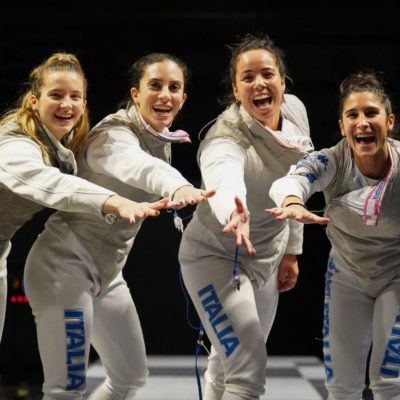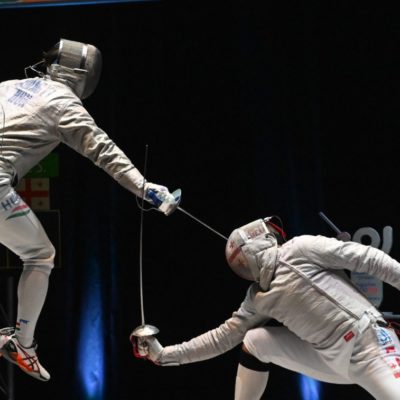What is it like to be the parent of a fencer? What are the challenges and realities involved in supporting your child in fencing and seeing them advance in their abilities and love of the sport?
Not surprisingly, the challenges that fencing parents face are very similar to the parents of any child participating in a sport or competitive activity, especially if they have the talent and drive to compete for national team honors. This article, written by a real life Fencing Parent, highlights the questions every parent must ask and answer for their own family.
I sat in a sleep deprived, semi-delirious state in Arricia, Italy waiting for our first Junior World Cup to begin. How did we get here? What are we doing? Exactly what is a Euro worth?
You may think you want your child to be an amazing fencer and have them traveling the world to be in fencing competitions. Maybe yes, maybe no.
Our family got into fencing due to a wrong turn (or maybe right turn) in a Recreation Center. My husband and son signed up for a fencing class. My daughter, then 9, wanted to try it, too. The teacher at the rec center was not tolerant of children, especially female children, so we found another club that taught only saber. My daughter picked up a blade, and was hooked.
Eight months after starting, both kids were signed up for the 2000 Summer Nationals in Austin, TX. Sure, why not? Let them fence in a competition. It’ll be fun, right??
We had no idea what we were in for…
She has outfitted the kids ever since the first equipment disaster. She will try to save you money and keep you from buying things you do not need. I know there are other good vendors like The Fencing Post. Find a good vendor, develop a relationship and keep working with them. They can truly save your kids at a competition. Find a vendor who stands behind their products. One of the main lessons we have learned over the following years: you get what you pay for. A “budget” fencing item often merely refers to how many times it will need to be replaced from your budget.
{mospagebreak} Coaches: Finding the right coach.
- Do they teach through humiliation or ridicule? If so, run away, don’t walk.
- When things are not going well, does the coach scream, or calmly work with the fencer? Look at the fencer’s body language when they’re getting coached on the strip. If they look like they wish they could crawl into a hole and disappear, look for another coach.
- Is the coach also the club owner, or totally dependant on the club owner? If they’re not fully autonomous, check their relationship carefully. Some owners run the club like their private fiefdom… for the benefit of their own kids, or a select few members. Understanding the politics of a club becomes very important.
- How are practices held? Do the coaches work well with both advanced and beginning students? Do they play favorites? Can you sit down with them and freely discuss your fencer’s progress?
Go by what your parent vibes tell you. If you think your coach is a little creepy or your kids don’t trust them, don’t trust them either. One very telling way to test a coach is to look at pictures that are taken with kids and coaches. What is their body English saying? How comfy do they look together? Are their smiles genuine or forced? Have a third party take a bunch of pictures at the next competition if there is any doubt in your mind or because you want the memories. We have some of the best pictures of our kids interacting with their current coaches at competitions, much different than the other pictures with earlier coaches.
My kids now have two excellent coaches. My daughter’s coach is as much a partner to her as a coach. He doesn’t try to control her and act like she is his puppet. He teaches her at her pace and in the way she learns best. At competitions, he knows how to support her when she loses and tells her what to try to look for next time. He uses video to help find the things she does well, as well as the things that need work. My son’s coach has taken a kid who never thought of himself as an athlete and made him into one.
{mospagebreak}
Parents as coaches:
As far as coaching goes, the vast majority of parents should not coach their own kids. Support them, water them, feed them, let the coaches coach. If your coach is yelling at your child after a bout and they are in tears, by all means step in. When they are on the strip, unless you are a qualified coach, don’t coach from the sidelines. At one meet, an ex coach was sitting on the side of the strip saying “stupid stupid” and banging his head on his hands as my daughter was fencing. It took all I had as a mother not to go up behind him and kick him in the butt as hard as I could. He never coached her again after that event.
We talk to our kids and find their comfort level. If we are getting too much in the way or becoming a little carried away during competitions, the kids can shoot us a signal. Accept that signal, calm down and move away. Have a spare parent near by to lean on. We all need somebody to lean on. : )
Shooting video is a great way to be near the strip, but not interfering. You will not be in the way, you’ll be distracted enough to relieve some of the intensity and do your kid some good all at the same time. It is hard for parents and a learning experience for them too. The harder the competition, the more you stress. It is not all about winning but more, trying to keep your kids calm and able to do their best.
When kids are pressed to the max in emotions and intensity, it is hard for a parent to remain calm. Neither kids nor parents should be allowed to abuse each other. If your kid is out in the hall having a huge temper tantrum because they lost, perhaps they need to grow up more before attending fencing competitions. They should get a little credit for taking it outside the competition area, but not much.
Parents should never have temper tantrums, or berate their fencers for any performance after a bout. We once heard another fencing mom reaming out her tearful fencer with: “We drove all this way, spent over a thousand dollars, and that’s all the better you could fence?” That’s not what your fencer needs to hear.
At the same time, as a parent, you have to learn how to deal with the emotional intensity of watching your kid in a close DE. We were shocked to find how close to heart-attack territory you get when your kid is at 14-14, trying to make the finals. Experience makes it a little easier, but not by much. Find another parent and give each other mutual support.
{mospagebreak}
Fencer Behavior: There is a lot of time and money invested in attending a fencing competition. Sometimes a parent needs to step in and guide their fencer away from playing with their friends before and during the actual competition. After the final bouts, if your child makes it that far, the merriment can begin.
Some fencers require more concentration and focus before and during the actual fencing than others. Gently help your kid keep their focus. Have them fence with someone during the long intervals between pools and DE’s to keep their mind on what they are doing. Listening to music and quiet conversation are also good ways to pass the time. Let your kids be but also keep an eye on them. Sometimes it takes an ogre parent around to get kids out of a situation they cannot quite handle on their own. Be that ogre!
Many kids fence out of their age groups, so they know kids in all of the age groups. Sometimes the friends will come over when the fencer is supposed to be fencing, and while not meaning to be inconsiderate, will totally distract the fencer. If you see this happening gently tell the other fencer to go elsewhere. If the gentle persuasion does not work, be a monster and tell them to come back later. Be a shield for your kids and the kids you know well and welcome the help, find ways to help them attain their best performance.
Traveling: This is a big issue.
If you are competing with younger kids, (under 18) traveling can be a real trial. There is always pressure for the kids to travel with the team, not with the parent. Some clubs make it seem like parents are not welcome.
BEWARE!
Remember, you are the child’s parent and you are in control. You know what is best for your kid. Do not relinquish your good sense due to pressure from coaches and team managers.
Fencing meets can be a dangerous place, especially for a younger fencer who is fencing above their age level. There are kids and hormones flowing through events like the Junior World Cups. Kids have hotel rooms and keys. Poorly chaperoned kids can be a recipe for disaster. It only takes a moment for a lifetime mistake to happen.
{mospagebreak}
If you send your kids with a team, make sure the team has plans for dinner every night or limits where kids can be. Without an adult, they should be dining at the hotel. Having younger teens out roaming in groups in strange towns in Europe or the US unaccompanied is not a good idea. Go on trips and check the supervision before letting your child go at it alone. Stay within your comfort level no matter what you hear from others.
Remember, YOU ARE IN CONTROL!
It may help to find another family who has concerns similar to yours and team up with them. Sometimes you can coordinate plans where one parent can do double duty on the trips. It takes a while to meet people you trust with your kids. Be patient and diligent.
Having a child come to serious harm for fencing is not worth it. Don’t take chances with your kid’s safety. Since 9/11 and the Iraq invasion, the world is not always a kind place for US citizens. Be as inconspicuous as possible. Traveling with an experienced coach can take a lot of worry out of competing overseas, especially if your coach is from a country besides the US.
Fencing is a great activity for kids. It is a sport that rewards intelligence and athleticism. Kids who have never done well in any other sport can do well in fencing because of their unique combinations of skills. Although this can sound like heresy, it is still just a sport. Make sure your family does the favorite activities they always have.
Having a child progress to the point of getting on world teams can seriously tax a families resources and time. You have to decide the worth of the strain of the competitions on the entire family, not just the fencer. The fencers have to leave siblings and pets behind. It can cost well over $20,000 a year to keep a fencer competing. There are definite downsides. The choice is a hard one.
{mospagebreak} Once a fencer gets into the rankings, everything intensifies. Your kids feel they cannot stop. This is the place where it’s easy to lose sight of why your fencer enjoyed this sport. Now the meets become all about the points…which meet has the best potential for the dollars spent. The camaraderie your fencer enjoyed with their fencing friends from around the country takes a back seat to the pursuit of a coveted place on the world team.
The system is set up so that a fencer needs to go to 3-4 World competitions plus the National Competitions to make a team. The points matter. It becomes a kind of trap.





